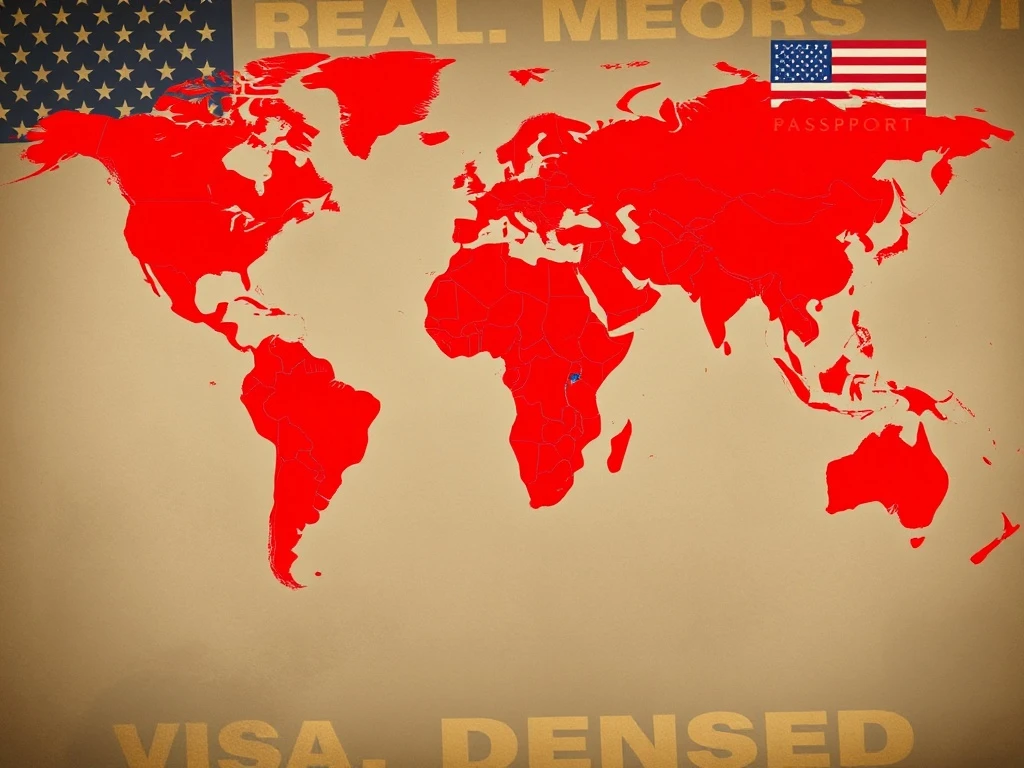The global business landscape faces a significant shake-up. The United States recently announced immediate visa restrictions on an additional country, marking a notable escalation of policies reminiscent of the controversial US travel ban. This development sends ripples across international markets and directly impacts entrepreneurs, investors, and businesses relying on global mobility.
Understanding the Expanded US Travel Ban
Authorities confirm the US government has broadened its visa prohibitions to encompass a newly designated nation. This action immediately halts visa processing for specific categories of individuals from that country. Furthermore, it imposes strict entry requirements for others. Initially, officials cited national security concerns as the primary justification for this expansion. However, critics quickly highlight the policy’s potential for wider economic and social disruption.
The new measures build upon previous executive orders. They reflect a continued emphasis on tightening border controls and immigration policies. Many observers view this as a direct escalation, extending the reach of a policy framework that first gained prominence during the Trump administration. Consequently, this move prompts widespread discussion about its legality and ethical implications.
Key Aspects of the New Restrictions:
- Immediate Visa Suspension: All non-immigrant and immigrant visa applications from the targeted country face an immediate halt. This affects students, tourists, and business travelers alike.
- Enhanced Vetting Procedures: Individuals from the designated nation already holding valid visas may undergo additional scrutiny upon arrival. This can lead to delays and potential denials of entry.
- Limited Exceptions: While some humanitarian or national interest waivers might exist, they are expected to be rare and difficult to obtain.
- Uncertain Duration: The new restrictions currently lack a defined end date, creating prolonged uncertainty for affected populations and businesses.
Economic Ramifications of the US Travel Ban Expansion
The expanded US travel ban carries substantial economic consequences. Businesses, particularly those with international operations, now face increased hurdles. Supply chains could experience disruptions, and the free flow of talent might diminish. Moreover, the tourism and education sectors in the US anticipate a noticeable decline in visitors and international students from the affected region.
Consider the impact on various sectors. For instance, the technology industry often relies on a diverse, international workforce. These new restrictions could limit access to skilled professionals, potentially hindering innovation and growth. Similarly, universities, which greatly benefit from international tuition fees and diverse perspectives, may see enrollment numbers drop. Therefore, the ripple effect extends far beyond just travel.
Impact on Global Trade and Investment:
The new visa restrictions inevitably affect global trade and investment flows. Businesses planning cross-border ventures or seeking to expand into the US market may reconsider their strategies. Furthermore, foreign direct investment (FDI) from the targeted nation could decrease significantly. This is because the ease of doing business becomes compromised when key personnel cannot travel freely.
- Supply Chain Disruptions: Companies relying on personnel movement for oversight or technical support may face operational challenges.
- Reduced Investment: The perceived instability and difficulty of access could deter foreign investors from committing capital to US ventures.
- Loss of Tourism Revenue: Hotels, airlines, and hospitality businesses in the US will likely experience a downturn in revenue from the targeted country.
- Brain Drain Concerns: Talented individuals from the affected nation, previously eyeing opportunities in the US, may now seek alternatives in other welcoming countries.
Geopolitical Fallout and International Relations
Beyond economic concerns, the escalation of the US travel ban carries significant geopolitical implications. International relations with the targeted country will undoubtedly strain. Other nations might also view the US policy as discriminatory or overly restrictive, potentially leading to diplomatic tensions or retaliatory measures. This situation underscores the complex interplay between domestic policy and global diplomacy.
Historically, such bans have often sparked international condemnation. They can undermine multilateral cooperation on issues like security and humanitarian aid. Moreover, the perception of the US as a welcoming destination for global talent and commerce might suffer. Consequently, this could affect long-term diplomatic ties and soft power. Nations often respond to such policies with their own restrictions, creating a cycle of escalating barriers.
Legal Challenges and Precedents of the US Travel Ban
The previous iterations of the US travel ban faced numerous legal challenges. These new restrictions will likely follow a similar path. Civil liberties organizations and advocacy groups are already preparing legal responses, arguing that the policy may violate constitutional rights or international law. Courts will once again scrutinize the justifications provided by the government, assessing whether the measures are truly necessary and narrowly tailored.
Legal battles often focus on the scope of presidential authority and the potential for discrimination. Past rulings have sometimes forced administrations to revise their policies. Therefore, the current measures could evolve as they navigate the judicial system. This legal scrutiny adds another layer of uncertainty to the policy’s future effectiveness and longevity.
Navigating the Future: Implications for Businesses
For businesses and entrepreneurs, adapting to this evolving landscape is crucial. Diversifying supply chains, exploring alternative markets, and investing in remote work capabilities become more vital than ever. Companies should also review their workforce demographics and talent acquisition strategies to mitigate potential disruptions caused by the expanded US travel ban. Proactive planning can help cushion the blow.
Furthermore, staying informed about policy changes and engaging with relevant industry associations is paramount. The international business community must advocate for policies that promote open trade and talent mobility. Ultimately, resilience and adaptability will define success in this increasingly complex global environment. The long-term effects of these restrictions remain to be fully seen, yet their immediate impact is undeniable.
In conclusion, the US government’s decision to target a new country with immediate visa stops signifies a notable escalation of its travel ban policies. This move carries profound implications for global business, international relations, and individual mobility. As the world watches, the economic and geopolitical ripple effects will continue to unfold, shaping future interactions on a global scale.
Frequently Asked Questions (FAQs)
Q1: Which country is targeted by the new US travel ban restrictions?
A1: The official announcement refers to a ‘newly designated nation’ without specifying its name in public statements. The focus is on the expansion of criteria rather than naming a single country, allowing for flexibility in policy application.
Q2: How do these new restrictions differ from previous US travel bans?
A2: These new restrictions represent an expansion of existing frameworks, building upon previous executive orders. They broaden the scope of visa prohibitions to include additional countries or refine criteria, making it harder for more individuals to obtain visas or enter the US.
Q3: What immediate impact will this have on international students and tourists?
A3: International students and tourists from the newly designated country will face immediate visa application suspensions or significantly enhanced vetting. This will likely lead to a sharp decrease in their ability to travel to the US for education or leisure.
Q4: Can businesses appeal visa denials for their employees under the new policy?
A4: While limited exceptions or waivers for national interest may exist, they are generally difficult to obtain. Businesses can consult immigration attorneys to explore any available avenues for appeal or special consideration, but success is not guaranteed.
Q5: What are the potential long-term economic consequences for the US?
A5: Long-term economic consequences could include reduced foreign direct investment, a decline in tourism and international student revenue, and potential challenges in attracting global talent, which could hinder innovation and economic growth in various sectors.
























